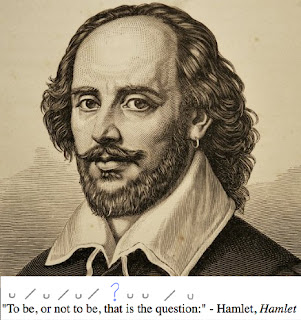Shakespeare's Mock Poetry
Shakespeare is famous for his witty use of language. And Shakespeare's self-awareness enhances this comedy: Shakespeare mocks the poet, knowing that he himself is one. He takes aim at poets through what we'll call "mock poetry"––bad poetry written by his characters.
Orlando's Love Poems to Rosalind
In As You Like It, Shakespeare mocks the act of writing love poetry and the lover/poet himself. In Act III, Scene 2, Orlando reads aloud one of his love poems to Rosalind:
"From the east to western Ind,
No jewel is like Rosalind.
Her worth, being mounted on the wind,
Through all the world bears Rosalind.
All the pictures fairest lined
Are but black to Rosalind.
Let no fair be kept in mind
But the fair of Rosalind." (As You Like It, Act III, Scene 2, Lines 88-95)
This poem is intentionally––and comically––terrible. Shakespeare forces the rhyme for comedic effect: to make "lined" and "mind" rhyme with Rosalind, we must read the name as roz-uh-LINEd.
And, through Touchstone, Shakespeare acknowledges the ridiculousness of this poetry. Touchstone claims that he could write poetry just as bad as Orlando's on the spot:
"For a taste:
If a hart do lack a hind,
Let him seek out Rosalind.
If the cat will after kind,
So be sure will Rosalind.
Winter garments must be lined,
So must slender Rosalind.
They that reap must sheaf and bind;
Then to cart with Rosalind.
Sweetest nut hath sourest rind,
Such a nut is Rosalind.
He that sweetest rose will find
Must find love's prick and Rosalind." (As You Like It, Act III, Scene 2, Lines 100-112)
Here, Touchstone mimics the forced rhyming in Orlando's poetry in order to mock it.
Shakespeare's Contemporary: John Donne
John Donne (1572-1631) also mocked the act of writing love poetry and the figure of the lover/poet in his sonnet "The Triple Fool":
"I am two fools, I know,
For loving, and for saying so
In whining poetry;
But where's that wiseman, that would not be I,
If she would not deny?
Then as th' earth's inward narrow crooked lanes
Do purge sea water's fretful salt away,
I thought, if I could draw my pains
Through rhyme's vexation, I should them allay.
Grief brought to numbers cannot be so fierce,
For he tames it, that fetters it in verse.
But when I have done so,
Some man, his art and voice to show,
Doth set and sing my pain;
And, by delighting many, frees again
Grief, which verse did restrain.
To love and grief tribute of verse belongs,
But not of such as pleases when 'its read.
Both are increased by such songs,
For both their triumphs so are published,
And I, which was two fools, do so grow three;
Who are a little wise, the best fools be." ("The Triple Fool")
We see a couple of similarities to Shakespeare here. There's the self-awareness and mocking of the lover/poet by a lover/poet. Donne argues that the process of writing and publishing love poetry is counter-productive: it "restrain[s]" the "grief" of an unrequited love, only to let it loose again. There's also the trope of a wise fool––as in the famous quote "The fool doth think he is wise, but the wise man knows himself to be a fool" (As You Like It, Act V, Scene 1, Lines 31-32).
Post-Shakespeare: Mark Twain
Mark Twain uses the same trope that Shakespeare does in As You Like It in his novel Huckleberry Finn. In Huckleberry Finn, Twain depicts young Emmeline Grangerford writing poetry. Instead of writing about love, like Orlando, Emmeline writes about death. Her poetry, like this poem she wrote about the death of a boy in her neighborhood that she read about in the newspaper, is just as comically bad as Orlando's:
"And did young Stephen sicken,
And did young Stephen die?
And did the sad hearts thicken,
And did the mourners cry?
No; such was not the fate of
Young Stephen Dowling Bots;
Though sad hearts round him thickened,
'Twas not from sickness' shots.
No whooping-cough did rack his frame,
Nor measles dread, with spots;
Not these impaired the sacred name
Of Stephen Dowling Bots.
Despised love struck not with woe
That curly head of knots,
Nor stomach troubles laid him low,
Young Stephen Dowling Bots.
O no. Then list with tearful eye,
Whilst I his fate do tell.
His soul did from this cold world fly,
By falling down a well.
They got him out and emptied him;
Alas it was too late;
His spirit was gone for to sport aloft
In the realms of the good and great." ("Ode to Stephen Dowling Bots, Dec'd.")
Twain employs the forced rhyme, just like Shakespeare does, to create comedy. Emmeline Grangerford writes phrases without meaning––such as "sad hearts thicken" and "sickness' shots"––just to make the poem rhyme.
Twain then takes this technique, of creating comedy through what is meaningless, even further: Emmeline Grangerford spends her entire poem telling us how Stephen did not die, rather than how he did die. And, of course, her list of ways to die (such as by "stomach troubles") and Stephen's actual manner of death ("falling down a well") are wonderfully funny.
Also, this poem is hilariously tone-deaf: Emmeline writes about death in a silly manner, with a meter that sounds more appropriate for a rhyme by Dr. Seuss. The tone of the poem creates comedy because Emmeline Grangerford takes herself very seriously as a poet––in the same way that Orlando takes himself very seriously as a lover. The audience members laugh not only at the poetry, but also at the poet's reaction to that poetry. Orlando and Emmeline think they are very talented poets, and that pride makes them a natural source of mockery.
 |
| Hugh Thomson, c. 1900. Watercolor. |



Comments
Post a Comment
All comments are moderated by the Green-Eyed Blogger to avoid spam. If you do not see your comment right away, do not worry; it is simply undergoing our routine moderation process.